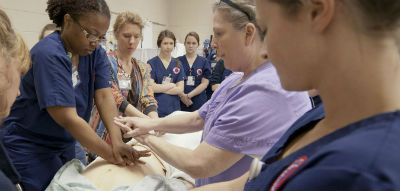 RNs who’ve built up solid work experience often start to think about ways they can get their nursing career to a higher level. A route most consider is getting a graduate nursing degree.
RNs who’ve built up solid work experience often start to think about ways they can get their nursing career to a higher level. A route most consider is getting a graduate nursing degree.
Advanced Nursing Career Paths
Nurses who go for a masters are generally interested in one of the career paths below: First, a class of jobs that fall under the heading of “Advanced Practice Registered Nursing” (APRN). Four types of APRNs are:- Nurse Practitioner: A specialty that incorporates many of the basic diagnostic jobs and treatment once performed only by MDs. Nurse practitioners are now often the first medical specialist seen by patients coming into clinics, hospitals or private medical offices. In many states, they are allowed to prescribe drugs.
- Certified Registered Nurse Anesthetist: Nurses who administer anesthetics. This is an old specialty, but one where practice parameters vary tremendously from one state to another.
- Clinical Nurse Specialist: A broad category of advanced nursing practice that can involve treating mental and physical health issues, administration, research and consultation.
- Certified Nurse Midwife: These specialists help women with low-risk obstetrical and gynecological care in birth centers, hospitals and sometimes even homes.
- Nurse Educator: A job that involves teaching younger or newer nurses a wide variety of skills, generally in a hospital or other larger clinical treatment facility. Some nurse practitioners also teach in a college or university setting.
- Public Health Nurse: A job that involves working in a medical center, a community organization or even the government to help develop better policies on treating and working with patients in the community.
Increasing Ethnic Diversity in Nursing Master’s Degree Programs
The population enrolling in master’s nursing programs in the U.S. is becoming more diverse. According to data from the American Association of Colleges of Nursing:- About 14.7% of all nursing masters degree students were African-American, up from 11.8% in 2007.
- The percentage of Latino / Hispanic masters students rose more sharply during the same period, from 4.9% in 2007 to 14.7% in 2017.
- That’s all against a background where the number of nursing masters students has risen dramatically. There were fewer than 55,000 students in U.S. nursing masters programs in 2007. By 2017, that number had shot up to more than 116,000.
Scholarships for Graduate Nursing Students
There’s a widespread misconception that scholarships only exist for bachelor’s degree students in nursing. In fact, there’s a wide range of top scholarship programs for nursing master’s students as well. It’s important to do your research when it comes to scholarships. Application deadlines vary a great deal from one to another, and many scholarships are not offered every single year. A few scholarships to consider: Oncology Nursing Foundation: $5,000. scholarships to RNs in a master’s program who are committed to oncology nursing. May be awarded to nursing master’s students who possess a BSN degree or those with a bachelor’s degree in another subject. For more information click here. March of Dimes Dr. Margaret C. Freda Graduate Nursing Scholarship Award: $5,000. scholarships to RNs who are enrolled in graduate programs focused on maternal-child nursing. Applicant must be a member of The Association of Women’s Health, Obstetric and Neonatal Nurses, The American College of Nurse-Midwives or the National Association of Neonatal Nurses. Click for more information. American Cancer Society Scholarship: $10,000 scholarship for a student pursuing a master’s degree in cancer nursing or a doctorate degree in nursing practice. The award is $10,000 per year, and may be given for two years. More information here. Dean Hayden Student Research Scholarship – Nurse Anesthetists: Up to $5,000 to a student of nursing anesthesia who is a member of the American Association of Nurse Anesthetists (AANA). Applicant must write an essay on how his or her research in school will benefit nurse anesthetists. Click to download information. Nurses Educational Funds Scholarship: $2,500 to $10,000 to full or part time registered nurses pursing a master’s or doctoral degree from an accredited school. Must have completed at least 12 credit hours of the program and have a minimum 3.6 GPA. More info here For a listing of many other scholarships open to graduation nursing degree students, click here.Salaries for Advanced Care Nurses
The U.S. Bureau of Labor Statistics tracks career opportunities and salaries for Nurse Anesthetists, Nurse Midwives, and Nurse Practitioners. It’s most recent (2016) statistics show a positive outlook for these advanced practitioners with a master’s degree in nursing.- Median pay: $107,460 per year / $51.67 per hour.
- Number of Jobs (2014): 170,400.
- Job Outlook 2014 – 2014: 31%, much faster than average. The highest job growth rate projected for this period is for nurse practitioners, at 35%.
Leadership Advice For Nurses With Graduate Degrees
Most advanced nursing jobs involve a greater element of leadership than jobs held by BSN’s – leadership of a clinic, of the nurse education program for a hospital or, in some cases, simply being the top person in charge of a critical task, as in the case of nurse anesthetists. We looked at a variety of interviews with Nursing School deans, and some of the key pieces of advice they gave for nursing leadership include:- Take time to build your credibility with your staff nurses.
- Learn to be a better public speaker
- Listen to other nurses when they want to give you their opinions.
- Stay committed to leadership, ever when it’s difficult.
- Remember that leadership is truly a form of service.
 If you have already worked as a nurse for several years, you may be looking for a new horizon with a
If you have already worked as a nurse for several years, you may be looking for a new horizon with a